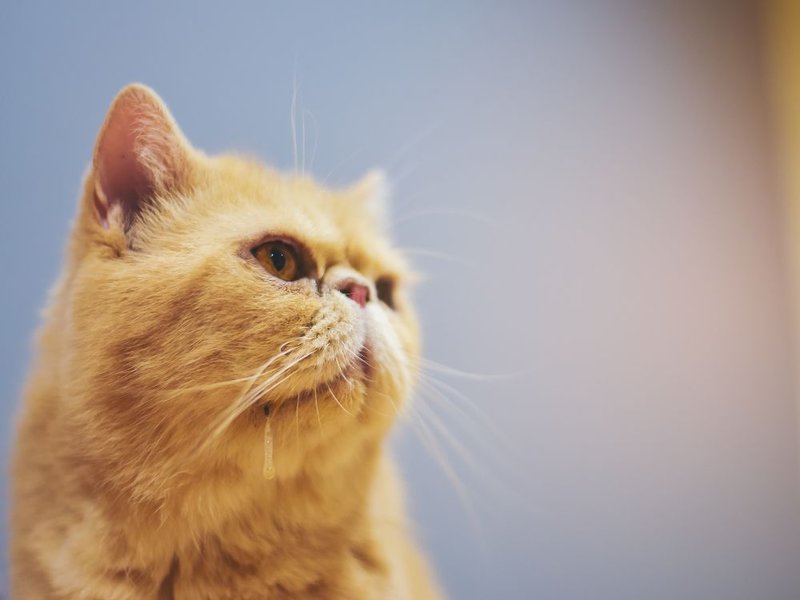Excessive drooling is considered normal in some pets. But in cats, excessive drooling is associated with numerous illnesses and complications. So I did my research, and this is what I found out.
Why does my cat drool – should I be concerned? Unlike some dog breeds, cats are not big droolers. In fact, most cats don’t drool when offered something tasty. Cats drool when happy and content, which is actually normal. However, excessive drooling can be a sign of a serious health complication, including organ infections.
Nevertheless, this doesn’t necessarily mean that excessive drooling can be a sign of severe physical health complications. Drooling can also be a sign of stress or motion sickness. In this article, we’ll focus on what causes drooling, how to stop excessive drooling, and the effects of cat drool on human beings. But before we get into that, we need to find out if cat drooling is normal.
Is It Normal For Cats To Drool?
Why Is My Cat Drooling When I Pet Her?
Drooling is a sign of contentment and relaxation that can be traced back to when your cat was young.
Therefore, it is normal for cats to drool when they are purring or kneading. Kittens knead their paws on their mother’s breasts when nursing to stimulate the release of milk.
When they mature, the feeling of contentment when you pet it leads to purring. And this stimulates drooling since purring is related to nursing. Your cat purrs when you bond with it, which means it drools when it is happy.
Some of the main causes of drooling in cats include:
Sleeping
Some cats drool when they are asleep and that is because they are relaxed. Remember, cats drool when they are extremely relaxed and happy. In fact, this type of drooling is an indication of an extremely happy cat.
Old Age
A little drooling is normal, especially when your senior cat is relaxed and happy. However, old age comes with numerous health issues like organ and dental diseases which can cause abnormal drooling. So, if your senior cat drools excessively you should take it to the vet.
Stress
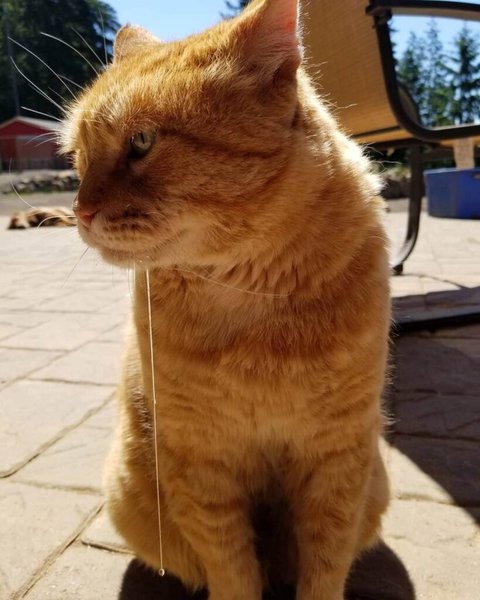
Cats can become stressed during a loud event, vet visit, or car rides and start drooling temporarily. If your feline pal becomes excessively stressed regularly, you should consult your vet. However, if stress and drooling are short-lived, then you shouldn’t worry too much about it.
Ingestion Of A Small Amount Of Flea Medication
Appropriate application of flea medication on your cat’s body can help you control a flea infestation. However, these medications can be toxic, and if your cat ingests a small amount of the flea medication, it will start drooling excessively. If that happens, make sure you take it to the vet immediately as any form of poisoning can cause rapid death.
Heatstroke
When the temperature is extremely high, your cat can become lethargic and start drooling. So, make sure you take it to a cool place as soon as you notice these signs. After all, cats don’t tolerate heat any better than us, despite their reputation as a desert creature.
Is Cat Drooling An Emergency?
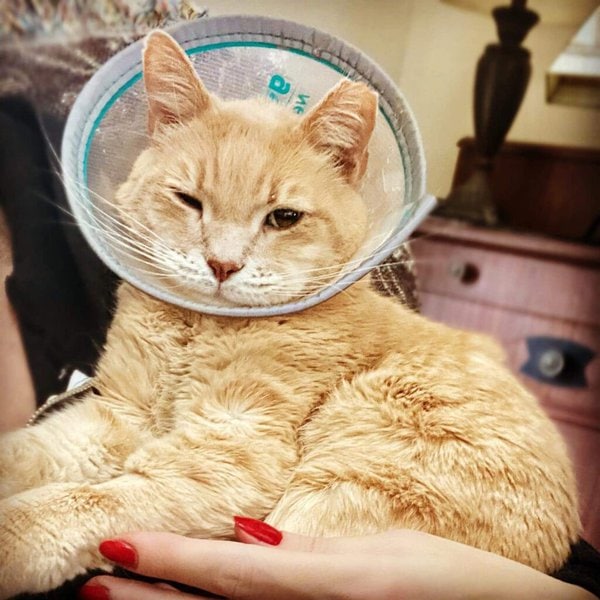
Our feline pals are not heavy droolers like dogs. And while a little slobber is normal, abnormal drooling in cats can be a sign of a serious health complication. Excessive drooling can be a sign of:
Feline Stomatitis
Feline stomatitis refers to inflammation in your kitty’s mouth.
Stomatitis is a common painful condition that affects cats of all ages and breeds. Stomatitis can affect the back of your cat’s mouth, where its jaws meet, or the gums surrounding its teeth.
Some of the symptoms of stomatitis in cats include drooling, halitosis, weight loss, decreased self-grooming, and inappetence.
Unfortunately, since the exact cause of this illness is unknown, there is no treatment for stomatitis.
Luckily, there are numerous ways you can manage this condition, and this includes antibiotic therapy and anti-inflammatory medications.
Rabies
Rabies is a viral illness that affects the spinal cord and brain of mammals, including cats. And the main reason this preventable illness strikes fear in pet lovers is that once its signs appear, the illness is close to 100% fatal. And one of the most common signs of rabies in cats is drooling.
Organ Disease
As cats age, they are more likely to get ill or experience numerous organ diseases.
Some of the organ illnesses that are associated with drooling include kidney and liver diseases. Some of the signs of liver failure in cats include drooling, vomiting, fever, jaundice, weight loss, diarrhea, and loss of appetite.
What Other Illness Is Drooling a Sign Of?
Drooling can also be a sign of tooth decay and mouth disease, which can be confirmed by pulling its lips back towards its ears. Drooling can also be a sign of infection of the sinuses, throat, and nose. Your cat can start drooling after eating a poisonous plant like chrysanthemums, azaleas, and tulips.
What Should I Do If My Cat Is Drooling?
Our feline pals drool for numerous reasons. Some of these reasons can be benign, while others can be a symptom of serious health issues. So learn to differentiate between normal drooling in your cat and excessive drooling that can be a sign of a serious health issue.
Once you know the cause of drooling, you can do the following:
Place a Towel on Your Lap
Cats also tend to drool when you pet them. So before putting your cat on your laps, you can first place a towel on the lap and then pet it. After all, no one can prevent this kind of drooling.
Take Your Cat To A Cool Place
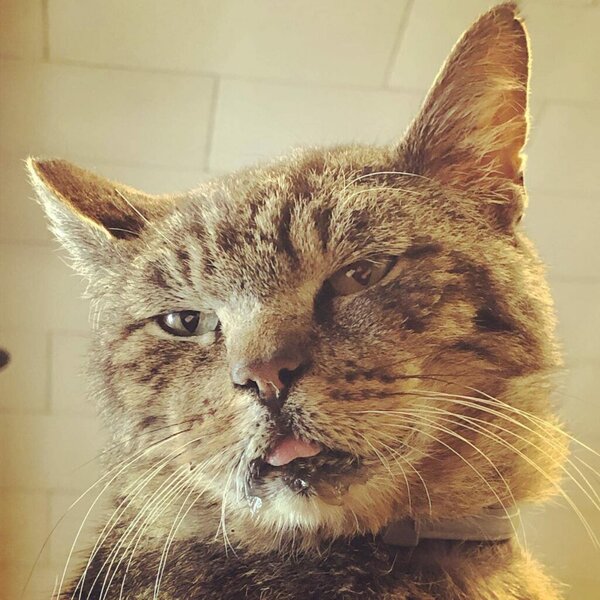
Even though cats are considered desert animals, excessive heat can cause heatstroke. Heatstroke can leave your cat lethargic and drooling. So the best method for dealing with this problem is taking your cat indoors in a cool place where its body can cool down.
Take The Cat To The Vet
If your cat is drooling excessively, you can diagnose the problem by looking at its gums and teeth.
If your cat has swollen gums or a decayed tooth, you can get an antibiotic like Smarthealth Naturopathics Feline Natural Antibiotic to help with the swelling and then take it to the vet. Remember, excessive drooling can be a sign of a wide range of illnesses.
And if your cat doesn’t have oral disease, then the problem could be more serious. So make sure you take your cat to the vet and have it checked and treated.
How To Stop Cat Drooling?
Once you know why the cat is drooling, you can then determine how to stop the problem. Some of the best ways to stop drooling include:
Anticipating Happy Drools
Cats drool when they are content and happy, like after eating certain types of food like catnip. So you can practise feeding your cat a restricted diet to reduce the amount of drooling.
You should also feed your cat on time to prevent it from drooling in anticipation of its meal.
Avoid Excessive Traveling
If your cat has motion sickness, then you should avoid excessive traveling.
Fortunately, there are numerous medications that can help prevent motion sickness. So ask your vet to prescribe the best medication for preventing nausea when traveling with your feline pal.
Identify And Deal With Any Oral Illness Like Gingivitis
Check for symptoms of any gum disease or gingivitis in your cat, which can cause drooling. Check if its gums are bleeding, red or swollen. If it has gum disease, treating the illness can help to stop drooling.
You can start brushing its teeth regularly and get an antibiotic to help with the infection. And to prevent future oral diseases that can cause drooling, we recommend that you clean your cat’s teeth using the Virbac cat toothpaste and toothbrush.
Virbac Oral Hygiene Kit is a complete kit that is designed for your cat’s dental hygiene. It features a dual-ended toothbrush with soft bristles for removing plaque, massaging the teeth surfaces and strengthening its gums. Plus, its toothpaste can be swallowed; therefore it is safe for your cat.
If it’s a kitten, you can look for signs of teething. Remember, teething can also cause drooling.
Other Ways Of Stopping Your Cat From Drooling
You can remove a foreign object that is stuck in its mouth that made it drool. You can also keep it away from poisonous plants. Ingesting poisonous plants can have severe consequences if not treated in time.
There are numerous home remedies for cat drooling that can help you deal with any oral illness like gingivitis. Some of the best home remedies like Echinacea, feverfew, or calendula can help you deal with gingivitis.
Is Cat Drool Harmful To Humans?
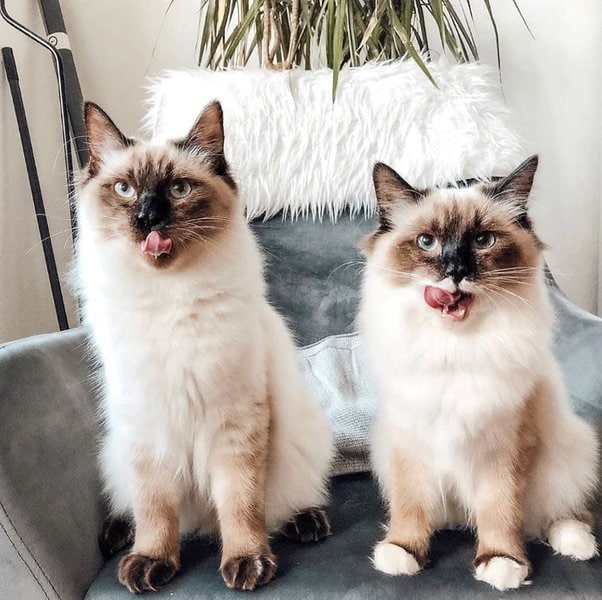
The probability of a cat drool affecting you depends on its health status.
The drool of a healthy hypoallergenic cat can be harmless to everyone. On the other hand, you can catch disease from the saliva of an unhealthy cat.
Cat Drool Can Cause Allergies
Cats produce numerous proteins that can trigger allergies in sufferers, with the main one being Fel d1 proteins. Fel d1 protein can be found in a cat’s urine, saliva, and dander. Exposure to the drool of a cat that produces high Fel d1 levels can trigger allergic reactions in some allergy sufferers.
Therefore, it’s always a good idea to adopt a hypoallergenic cat that produces a low amount of allergy-causing proteins like Fel d1. After all, the drool of a healthy hypoallergenic cat can be harmless to everyone including allergy sufferers.
Cat Drool Can Transmit Rabies
Cats with rabies tend to drool a lot. And since rabies can be transmitted through saliva, you can catch this disease from cat drool. The virus can affect you if your open wound gets exposed to its saliva when you are treating it.
Other Zoonotic Illnesses Transmitted by Cat Drool
Cat drool can transmit a wide range of bacterial and viral infections that affect human beings. Illnesses like cat scratch disease are caused by a bacterium known as Bartonella henselae that is transmitted by cat drool. Therefore, exposure to the saliva of an infected cat can be quite harmful to humans.
Related Questions
Why Would A Cat Suddenly Start Drooling? Normal drooling in cats is usually accompanied by pleasure and excitement. However, abnormal drooling can appear suddenly and last for several hours. A cat can start salivating excessively if it is overheated, it has something stuck in its teeth, has eaten a poisonous plant, or is ill.
Why Is My Cat Drooling And Not Eating? Severe gingivitis, abscessed teeth, and an infection in its mouth can cause your cat to drool and not eat. These illnesses can make swallowing, chewing, or even opening of its mouth quite painful. And this will make it hard for your cat to eat.
Why Do Cats Lick You And Then Bite? Your cat can lick and then bite you if it wants to bond with you by simply grooming your body. This is also a way of showing you affection or informing you that it wants to play with you. By licking and then biting you, the cat can also be informing you to stop giving it physical attention.

